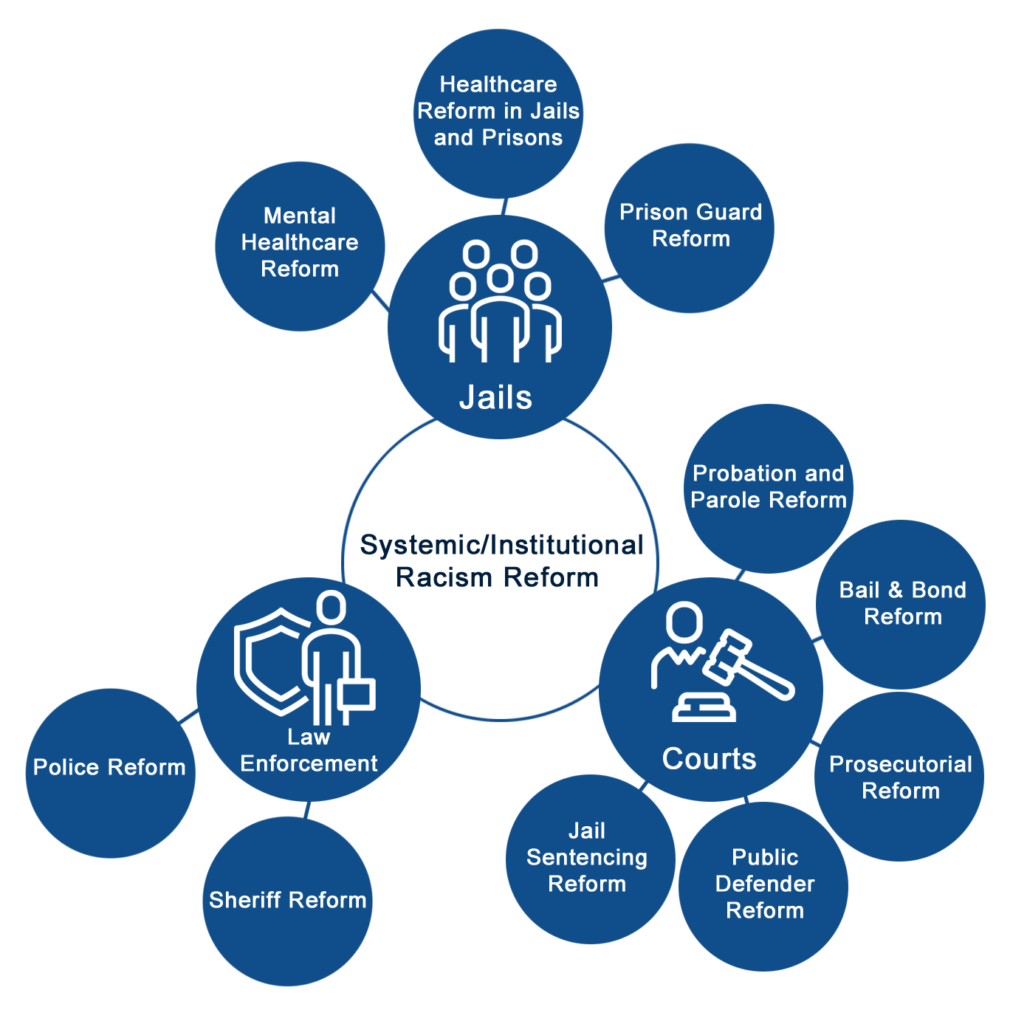Our Mission
The Fair Fight Initiative exposes systems of racial injustice in America and works to end systemic racism.
Before we can talk about how to reform the criminal legal system, we need to address how we view every aspect of it, starting with the very definition of what how we define criminal behavior.
The act of committing a crime is just that – a single act, not the defining aspect of who someone is. And yes, as part of the societal contract we all share an understanding that laws are there for a reason. The question America needs to answer is how we went from a rate of under 100 per 100,000 in prison and jail, to over 400? What happened that turned America into the world’s leader in incarceration, at a cost of over $180 billion a year? How did America become a place that embraced policy that acts as if we have no recourse but to enact a harsh punishment in an attempt to change criminal behavior?
Too often, our society uses this punishment as a crutch. It’s much easier to say that “rules are rules” and base the relationship between people and the system entirely on consequences. Rather than base a system on equality and respect, we base it on punishment, because punishment is easier.
But punishment is also inherently violent. There’s a reason lady justice is depicted with scales in one hand and a sword in the other.
Punishment is turning the harm we’ve received from people accused of breaking the law around on them, creating a cycle of punishment. This cycle only causes harm to everyone involved, but allows us feel like we have the moral high ground because, after all, we are only responding to someone’s “criminal” behavior.
And to keep that moral high ground, we need to feel like we’re not handing down these punishments to a person, a fellow human with their own heart and soul, their own hopes and dreams. No, if we want to sleep at night we need to feel like the person on the receiving end is nothing more than a criminal, forever defined by one action.
And so the system defines what a criminal is, negating everything a person might do beyond a single criminal act. And it punishes that person in the only way it knows how – through violence. All punishment is inherently violent in nature. With punishment, we feel like there is moral justification for someone to suffer for their wrongdoings and mistakes. Instead of considering the limitless possibilities of any given human being, we only acknowledge their mistakes. Worse, we’ve allowed policies to be adopted in our names that argues that criminal behavior can only be transformed into good by inflicting punishment, guilt, shame, and violence. If a little bit of punishment doesn’t produce the change we seek, we try a bit more. Go far enough and corporal or capital punishment may seem like a reasonable option. It is an ignorant and disheartening belief in this country that punishment, violence, and force over people is a legitimate option to get people to change for the better.
And it’s no secret that this cycle of violence only perpetuates onward with no strategy for change. According to HealthyPeople.Gov, the United States has a 50% recidivism rate with 2 out of every 3 people being rearrested after 3 years.
And even though this cycle fails to produce results, we continue to militarize our police departments and use more force with weapons for war on the streets against our citizens, which only creates more violence and less trust between communities and police.
As a result, we have a system not built on justice, but on vengeance. We reduce the person who committed the crime to less than a person in need of guidance or redemption. We reduce them to a single label – criminal – which will follow them around for the rest of their lives.
This vengeful approach, based on punishing the person accused of a crime rather than deterring crime and keeping our communities safe, serves no one. It doesn’t serve the victims; it only creates more of them. It takes the pain they’ve gone through and weaponizes it, giving them a moral cover for their deeds. And it does not serve we the people. It merely serves to control and instill fear in all of us.
And we’ve reached the critical tipping point where we, as a society, need to face reality. Harsher and harsher sentences do not make us safer and have not reduced the recidivism rates. Militarizing police and allowing police to use force has made our communities less safe and has become a major public health concern for Black communities, and for young Black men in particular. Our communities are less healthy, less stable and more hostile because we’ve let this cycle of violence grow to a point where some communities are afraid of law enforcement and government officials altogether.
We need to understand that punishment is not the answer, or at least not the only answer. We need to create opportunities for rehabilitation, growth, and real transformation. We need to allow people who have committed a crime to atone for their mistakes, move past them and put in the work to heal the hurt that they have caused.
Justice needs to be about more than just vengeance. It needs to be a discipline based on compassion, humility, and humanity and a true thirst for equal protection for all citizens.
But too often, we view compassion as a weakness rather than the strength it is. Creating compassion, and using mercy more often than the sword, takes a great amount of strength. It does not undermine our commitment to the victims. Their grief needs to be heard. We need to ensure that the same compassion we show them is extended to everyone, allowing room for those who were wronged to feel whole again and for those who committed the act to atone.
Greatly reducing the prison population, reforming policing policies, and halting the creation of new prisons is a great start, but in order for a new system to even begin to work, we need to consider redemption. It’s about imagining a justice system in which those who commit crimes are truly rehabilitated and given a chance to learn from their mistakes and provided skills to return as an active, positive contributing member of society.
The negative effects of this dogged fixation on revenge rather than rehabilitation do not merely affect the victim and the person who committed a crime. They ripple outward, creating a society where everyone is caught in a cycle – the families, the communities and the taxpayers who spend over $180 billion dollars a year on incarceration alone keeping a broken system running and growing.
There is no single change for such a widespread institutionalized failure of justice. To truly correct our course and bend our path toward justice, we need to deconstruct everything we know about crime, analyze every aspect of our system, and create something brand new. We need to rebuild our system with a holistic approach which affords its citizens the dignity, respect, forgiveness and opportunity for redemption they deserve.
But first, we have to accept the fact that the criminal justice system as it stands is no longer viable and is already imploding. Its dysfunction puts everyone of us at risk, no matter what side of the law we find ourselves on. These are hard truths to swallow, but we must if we are to move forward. Our government will not fix these problems on its own and it is up to our own citizens and local communities to demand change because criminal justice reform is a public safety issue and has been for a very long time.
The Fair Fight has started a guide that can be collectively shared with the general public to start chipping away at the many working parts of the dysfunctional and violent broken system of justice. This guide is by no means complete and it will continue to be a work in progress as we add to it. Below are some major topics that we will begin to distill that outline the dysfunctional parts of our criminal justice system that need immediate attention.

Recent years have shined a spotlight on one of America’s ugliest truths: the systemic racism that infects America’s history also infects law enforcement, and the fallout has come in the form of countless deaths, injuries, trauma, and injustices aimed at Black and Brown communities. From racial profiling, to excessive use of force and corruption, this has made our communities more dangerous than ever and has created less trust between the community and law enforcement.
We need to seek out a fundamental shift in the relationship between our communities and the police. This means more than simply altering regulations or creating stricter consequences for officers who violate use-of-force policies. This means restoring the public confidence in those who serve us by redefining how police work with communities. Using force and power over citizens will not open dialogue between the police and communities in our country.
Sheriffs control almost every jail in the United States. Jails are designed to hold people pretrial, i.e., people merely accused of a crime and not convicted. This year, more than 800 Americans will die in sheriff’s jails where nearly 2/3 of people have not even been convicted of a crime. At the forefront of these racist policies are our nation’s sheriffs. The system has rewarded them for fueling mass incarceration and deportation. It has encouraged them to over-police communities of color. And it has funded them through a jail system that punishes even though the vast majority of those detained are supposed to be innocent until proven guilty.
Just as many politicians and police unions have turned a blind eye to police brutality, these same forces have allowed prison and jails, and the guards who run them, to incarcerate people in horrific and deadly conditions, overseen by guards with virtually unchecked power. From emotional and physical abuse of people in jail and prison to the torture and trauma of solitary confinement, the sheer amount of unchecked power remains invisible due to a lack of independent oversight and accountability.
In a perfect legal system, the color of your skin would have no bearing on your ability to navigate the halls of justice. But it’s becoming increasingly clear that in the American system, race matters. The amount of melanin in your skin can make you more likely to be profiled by police and detained pretrial, can influence the amount of your bail, and can determine whether you will be sentenced to prison for longer sentences and even death for your crimes.
The problem lies in how invisible all of this has become to most white people. By definition, institutionalized racism is ingrained in everyday life. For most people, this is just how it’s always been. And so, obscured from view, the machine rolls on. Under its wheels, marginalized people and their communities are ground down and torn apart. We say all men and women are created equal, then we turn a blind eye to the overwhelming inequality that defines us. The Fair Fight Initiative exists to open those eyes and direct them toward the corruption all around us. We can no longer afford to look away while our children suffer and die.
It’s been said that if the only punishment for a crime is a fine, then that crime only exists for the poor and oppressed. But for every crime that results in being booked into a jail, then it carries with it bail and bond, ensuring that prolonged detention only exists for the poor. It will keep people in jail even though they are not guilty, apart from the crime of being unable to afford bail. One judge deciding to impose an unreasonable cash bail on a person’s freedom is all it takes for an innocent person to lose their house, their job, and all possessions they have. These collateral consequences leave traumatic imprints on children, families, and communities. What the public may not know is that many people will simply plead guilty to a crime they did not commit in order to get out of jail faster, only to end up on probation. And since probation rules are very strict, many of these innocent people end up back behind bars because they missed a simple phone call or short appointment with their probation officer.
People in America’s prisons and jails are disproportionately more likely to face a host of chronic health problems, ranging from diabetes and high blood pressure to long-term problems with mental health and substance abuse. Yet despite this clear need for greater care, correctional healthcare is often outsourced to companies that provide little to no healthcare at all and cut corners to line their pockets with profits at the expense of human life.
As absurd as it may sound, right now the United States prison system is actually the largest mental health system in the entire world with poorly trained staff to get people well and conditions like solitary confinement that make people with mental illness sicker. Because we as a nation have not been willing to fund mental health services, or even to view healthcare as a basic human right, we have created a lack of mental health facilities in our communities.
The results speak for themselves: we are less safe and more likely to lock up people with mental illness. Because prisons and jails are not therapeutic environments, no number of trained personnel can truly help incarcerated people with mental illness get well. There is only more infliction of pain and suffering on human life, which perpetuates unfavorable behavior. It’s no coincidence that six of the 10 states with the least access to mental health care also have six of the highest rates of incarceration.
Of every cog in the criminal justice machine, perhaps no single official wields as much unchecked power as the prosecutor. Operating with little to no oversight with the exception of elections every 4 to 6 years, prosecutors have virtually unchecked power to coerce people to admit to crimes they didn’t commit, cherry-picking the charges that result in harsher prison sentences, and holding immense leverage when it comes to defining plea agreements. Their outsized role plays a key part in driving mass incarceration.
Prison populations have risen dramatically over the last 40 years, jumping nearly 700 percent between 1972 and 2012. Helping to drive this growth is the rampant extension of prison sentences. Through mandatory minimum sentences, automatic sentence enhancements, habitual offender statutes like “three strikes” laws, so called “truth-in-sentencing” laws, and the abolition of parole, people are facing more and more prison time than they did 40 years ago. Decades of these policies are now under the microscope and are being readjusted, but the fight has only begun.
For a system that claims to be geared toward rehabilitation—note how many of our prisons are called “correctional institutions”—it is shockingly common how often we allow people in jails and prisons to live in inhumane conditions. Many of our prisons and jails are old and unkept, leading to dangerous and unsanitary conditions. Many are understaffed, leaving incarcerated people at risk of violence and neglect. Some are run by corrupt officials who abuse both their power and the people in their care subject to beatings and psychological torture, in conditions are beyond deplorable. People with a legitimate medical needs are denied the treatment they require because many for-profit medical providers value profit over care.
Probation and parole were built with the best of intentions – giving people a way to pay their debt to society without taking away their freedom. But rather than giving people a way to turn their life around, these systems have created a labyrinth of trap doors and dead ends. Show up a few minutes late for an appointment, unwittingly cross city lines to run an errand, and you’re right back behind bars.
Of the 6 million people currently working their way through the U.S. Criminal Justice System, nearly 4 million are on parole or probation. This is a massive chunk of the population who have received relatively little attention. Probation and parole are as broken as the rest of the system, leading people down a path to reincarceration and making our communities less safe.
Clearly, the system isn’t working. By emphasizing incarceration, we actively create a revolving door system that continues to grow recidivism rates and increases the taxes you pay.
According to several national surveys, nearly 70 percent of incarcerated people have no high school diploma, 40 percent are functionally illiterate and 19 percent have no reading ability whatsoever. By utilizing detention and incarceration only when necessary and emphasizing treatment and rehabilitation rather than punishment and violence , we can make a change in those numbers. People in prison who are given the opportunity to learn, to acquire much-needed life skills, are far more likely to gain employment and achieve self-sufficiency on the outside.
Finally, addiction to drugs and alcohol is a disease, and failing to provide treatment in the community leads to repeat arrests. Providing substance abuse treatment in our communities rather than arresting people struggling with addition is an important step toward ending mass incarceration. Without it, we cannot say we support rehabilitation over incarceration.
Public Defender Reform
You have a constitutional right to representation of counsel. But the system that provides these legally mandated public defenders is underfunded and overworked. People accused of a crime, facing deprivation of their freedom, deserve effective lawyers. The disparity between well-funded prosecutors and police departments, and underfunded public defenders, is a national disgrace.
Among ways we can strengthen our public defenders are by increasing the resources available to them, allowing for professional development and training, and providing sufficient investigators and paralegals to support their work. With the right resources, public defenders can be a powerful tool in fighting prosecutorial corruption and helping keep innocent people out of jail.
As the criminal legal system continues to break down, this guide will continue to evolve to help illustrate where these breakdowns are happening and potential ways things can be changed. But it’s not something we can do alone. The Fair Fight Initiative depends on your financial support to continue the fight against systemic racism and build on the mission of reforming our broken system.
When you donate to FFI, you help us:
Featured in The Media




